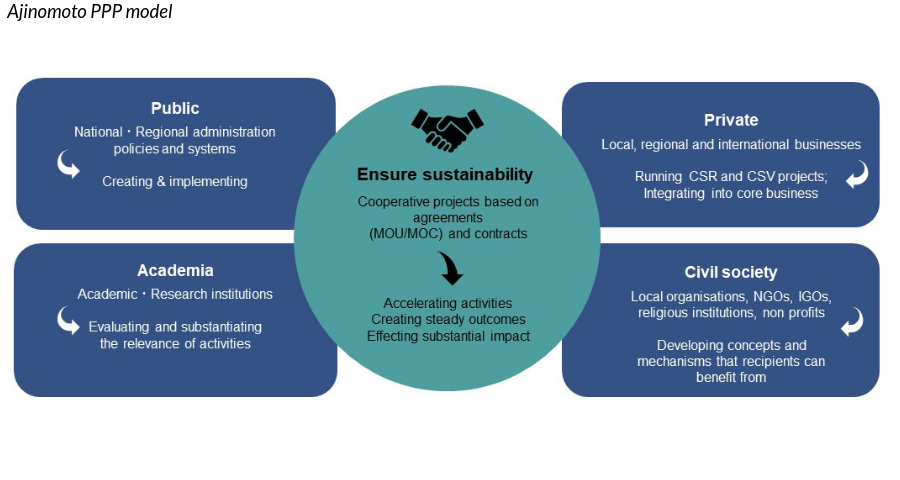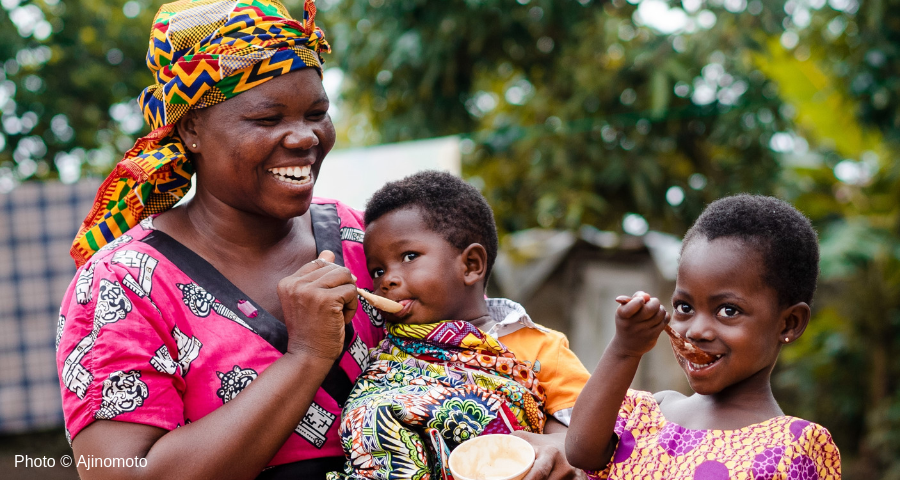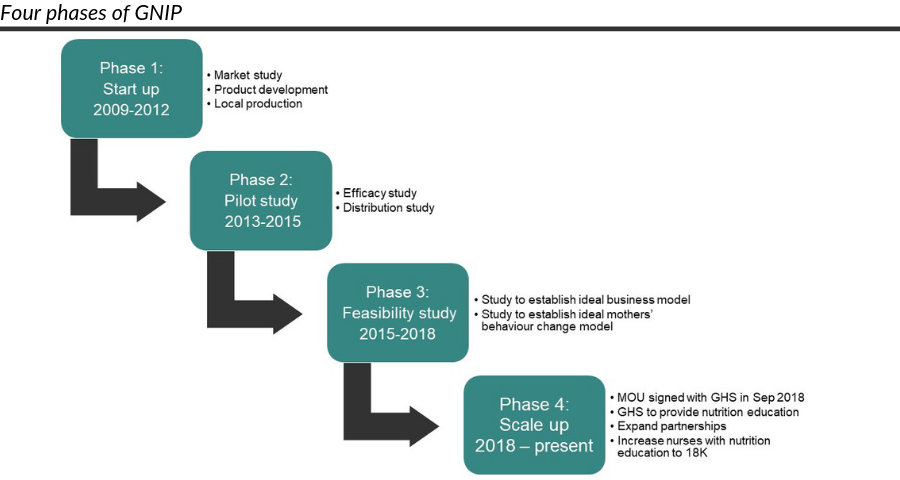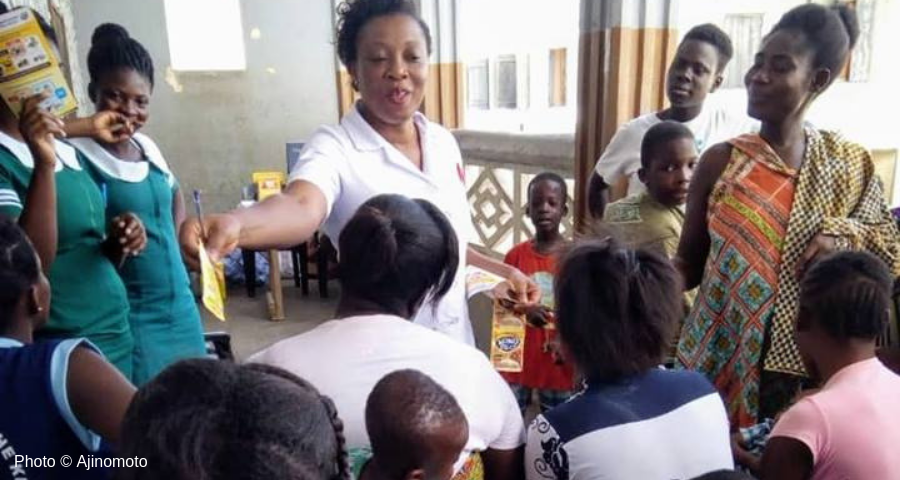About the partnership
The Ajinomoto Group started the Ghana Nutrition Improvement Project (GNIP) in 2009 as part of initiatives to commemorate its 100th year. The Group has since been steadily implementing the project in cooperation with the government of Ghana, University of Ghana, and other international NGOs and corporates. In April 2017, the project was transferred to The Ajinomoto Foundation to realise more social impact in collaboration with public sectors (such as Ghana Health Service).

Background
Koko is a traditional complementary food in Ghana – porridge made from fermented corn. However, the levels of protein and micronutrients in koko do not meet the WHO’s nutrient requirements and dietary recommendations.
To address this nutrient gap, the Ajinomoto Group, in collaboration with various partners, developed KOKO Plus, a supplement containing amino acids, which is added to koko during cooking and provides sufficient nutrients for children, including Calcium, Iron, Zinc, Iodine, Folic Acid, Vit A, B1, B2, B6, Niacin, K1, D3, B12. The World Food Programme (WFP) verified the efficacy of KOKO Plus and registered it as a “Nutritious powder” in its food basket in February 2018. The product was designed to meet the needs of local communities: it is affordable (USD 0.10/sachet/day); it is desirable (in line with local tradition and preferences); and it is accessible (available in kiosks and one-year shelf life improves access in rural areas).
The social business model for GNIP is based on national policies and works with private businesses in Ghana. Ajinomoto has provided people, goods, and financial and technical support to help establish a social business model which works with and through local companies, local distribution networks and local products.

Partners
Successful social business models require the input and commitment from a wide range of stakeholders, including for example local government, academia and private companies, as well as international NGOs and aid agencies. For GNIP, The Ajinomoto Foundation partnered with the following:
- Plan
- CARE International
- ESM (social marketing company headquartered in South Africa)
- EXP (marketing company headquartered in South Africa)
- Ghana Health Service (GHS)
- International Nutrition Foundation (INF)
- Japan International Cooperation Agency (JICA)
- Japanese Organization for International Cooperation in Family Planning (JOICFP)
- Ministry of Foreign Affairs of Japan
- USAID
- University of Cape Coast
- University of Ghana
- University of Tokyo
- World Food Programme(WFP)
- Yedent Agro Group
Objectives
To create a sustainable business model and market for a product that can help improve nutritional status of infants as parents begin complementary feeding practices in Ghana.

Overview of activities
The social business model developed for GNIP KOKO Plus programme has four components, which were addressed across four phases (see below).
Public private engagement was particularly important for Phase 3 of GNIP. To ensure regular consumption of nutritious complementary foods, it was important to change the behaviour of mothers and caregivers. According to consumer research conducted by the Ajinomoto Foundation, GHS community health nurses were ranked as most influential with mothers because they were both familiar and highly trusted. Establishing a PPP between GHS and Ajinomoto was therefore critical to the success of this programme. See more on the KOKO Plus Behaviour Change Model and the role of GHS nurses in this market based approach.


Outcomes
In a peer reviewed study conducted by researchers from University of Ghana, Tufts University, Nevin Scrimshaw International Nutrition Foundation and Ajinomoto, the authors concluded that: “KOKO Plus food supplement improved the nutritional profile of koko to satisfy the nutrient intake requirements of young infants as recommended by World Health Organization. KOKO Plus was microbiologically safe, with estimated shelf-life of more than 12 months.”
GNIP estimates that’s KOKO Plus has reached 9,000 children in 2017 and 20,000 children in 2018, with a target to reach 70,000 children in 2019. According to Ghana’s 2014 Demographic and Health Survey (DHS), the stunting rate for children under five is 18.8%. Calculating for population growth would mean in 2018, approximately 600,000 weaning-age children in Ghana are not getting the nutrition they need to grow and thrive.
The Ajinomoto Foundation is planning to expand the project’s activity areas from 2019, so that by 2023, 300,000 weaning-age children will benefit from improved nutrition. Reaching this target would have a positive impact on society.
Challenges
The “Last Mile delivery” problem can be difficult, especially for remote and rural areas. To try to address this, GNIP is testing an innovative distribution model in the northern part of Ghana, with a network of sales women using VSLA (Village Savings and Loan Association) developed by international NGO as a platform.
At present, the project is running at a deficit on a local company business base, so it is necessary to increase sales volume by expanding the project’s activity areas and recipients. If GNIP hits its 2023 target of 300,000 children, the project will no longer be in a deficit. If this can be achieved, it will also make Ghana better equipped to run its own projects and make local businesses more sustainable, reducing the need for aid investments.
To go beyond just information sharing, GNIP incorporated a three-level approach to promote behaviour change: Raise awareness of malnutrition, including cause and prevention; Promote understanding good nutrition; Ensure product is desirable, and easy to buy, cook and eat.
It is relatively easy for Ghana’s administrative organisations to form cooperative agreements with an NGO or NPO, but it is quite difficult to form these agreements with private companies. It is easier for private companies to enter into cooperative agreements with the country’s administration if an NGO or NPO acts as a bridge between the two sides. Since becoming a public interest incorporated foundation in 2018, Ajinomoto Foundation has been able to form a memorandum of collaboration (MOC) with the Ghana Ministry of Health and Ghana Health Service (GHS), which has accelerated the project’s commercialisation – but it took four years to form an MOC.
Lessons learned
Commitment is key: From the start of this project ten years ago, GNIP has continued because of the dedication of various members of staff of Ajinomoto Group and Ajinomoto Foundation. It has been necessary to stimulate interest from new researchers, to find additional funding and maintain the project.
The more the merrier: It may have been easier to overcome some of the administrative hurdles faced in the project if other companies and organisations committed to the same goal were involved. For example, the government cannot sign an MOU with just one company because government is “public” sector, so it is difficult to collaborate with just one company.

Opportunities for the future
The plan is to fully localise the project’s operations in future. As first stage, The Ajinomoto Foundation established local NGO, “KOKO Plus Foundation” on 1 April 2019.
![]()
Further expanding the partnership with the GHS to cover the nation will help to scale up product sales and make this nutritious business sustainable. This way GHS workers can provide nutrition education and product recommendations at health centres, and switch from the existing approach of retailer-based direct sales to using distributors.
Additional information
To learn more about the project, see:
- Ghana Nutrition Improvement Project: A Genuinely Synergistic Public Private Partnership
- KOKO Plus: A social business model for improved nutrition
- Better nutrition, Brighter future
- Spotlight on GNIP
- KOKO Plus on Facebook
- KOKO Plus TV commercial
For more evidence around the impact of GNIP, see these journal articles:
- Changes of Plasma Amino Acid Profiles in Infants With a Nutrient-Fortified Complementary Food Supplement: Evidence From a 12-Month Single-Blind Cluster-Randomized Controlled Trial (2021)
- Development and Sensory Shelf-Life Testing of KOKO Plus: A Food Supplement for Improving the Nutritional Profiles of Traditional Complementary Foods (2019)
- A macro- and micro-nutrient fortified complementary food supplement reduced acute infection, improved hemoglobin and showed a dose response effect in improving linear growth: a 12 month cluster randomized trial (2019)
- Effect of the provision of a macro- and micro-nutrient fortified complementary food supplement on nutritional status of Ghanaian infants (2017)
- Assessing Program Coverage of Two Approaches to Distributing a Complementary Feeding Supplement to Infants and Young Children in Ghana (2016)
- Fostering reflective trust between mothers and community health nurses to improve the effectiveness of health and nutrition efforts: An ethnographic study in Ghana, West Africa (2016)
- Effect of a macro and micronutrient fortified complementary food supplement (KOKO Plus) on linear growth of children 18 months of age in Ghana ( 2016)
- Role of Protein and Amino Acids in Infant and Young Child Nutrition: Considerations for the Development and Delivery of High Quality Complementary Food Supplements (2015)
- Optimization of the nutrient content and protein quality of cereal–legume blends for use as complementary foods in Ghana (2014)
- Improving complementary feeding in Ghana: reaching the vulnerable through innovative business - the case of KOKO Plus (2014)
- Effect of lysine supplementation on health and morbidity in subjects belonging to poor peri-urban households in Accra, Ghana (2010)
Note from the editor: Nutrition Connect aims to share examples of partnerships and collaborations that result in positive nutrition outcomes. We seek examples that objectively demonstrate the potential of public private engagement, in particularly those which are underpinned by sound methodology, including evaluation. However, Nutrition Connect and its funders do not endorse any specific company, government or partnership, and in all cases a single example may not reflect the institution’s overall impact on food and nutrition security. For more information, the Editorial approach sets out our policy for content management, including case studies. Any related queries should be sent to nutritionconnect@gainhealth.org.